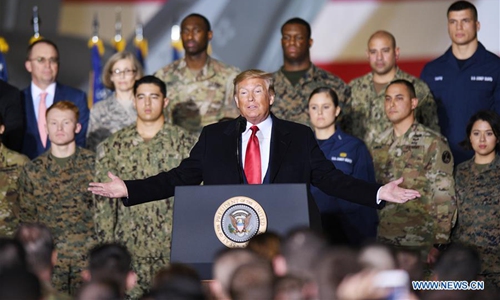HOME >> OPINION
Will US Space Force take hegemony to cosmos?
By Liu Weidong Source:Global Times Published: 2019/12/31 10:03:45
US militarization of space endangers us all

US President Donald Trump speaks at a signing ceremony for the National Defense Authorization Act for Fiscal Year 2020 at Joint Base Andrews, Maryland December 20, 2019. Trump signed into law a 738-billion-U.S.-dollar defense bill which includes controversial provisions calling for sanctions against Russia and Turkey. Trump approved the 2020 National Defense Authorization Act, which will increase the U.S. defense spending by about 20 billion dollars, or about 2.8 percent, on Friday night at a signing ceremony held at the Joint Base Andrews near Washington. (Xinhua/Liu Jie)
After signing the National Defense Authorization Act (NDAA) for Fiscal Year 2020 on December 20, US President Donald Trump announced the establishment of the US Space Force, the sixth military branch of the US armed forces.
Though the new arm of the military will not substantially augment US defense capability, it will definitely prove useful if the country's might is challenged in space. Preparing in advance is what the US always does, since the US is used to being in the lead. When the US believes that some countries might pose a potential threat to it in a certain field, it tends to seek a dominant position before the challenge can actually raise its head. Obviously, the main purpose of the US Space Force is to prepare for future challenges in space.
Since only China and Russia can compete with the US in space, they naturally become the main targets of this new change in the US military. Not only do China and Russia have relatively established techniques in space exploration, they are also the two biggest competitors of the US. Therefore, the US has to make sure that it occupies commanding heights and takes the lead all the time. By doing so, it will have the upper hand in terms of either attack or defense.
The major challenge faced by the US government after establishing the space force is the military budget. Cultivating a new service would undoubtedly lead to the budget shooting up, but there is only limited room for increase. Besides, Trump's wall construction along the US-Mexico border, soldiers' rising wages and the appropriation to the new military service will easily result in a higher deficit and will affect US investment in other defense arms. However, as the first country with a space force, the US will certainly have an advantage in the military field.
In the current international situation, the risk of an arms race that could be triggered by the US Space Force is much lower than that during the Cold War. For the moment, Russia does not have enough power to compete with the US because of its economy that is far from supporting sustainable development of its defense technologies. China does not intend to be in the race for hegemony with the US. Moreover, China has already learnt from the experience of the Soviet Union - engaging in an arms race with the US would possibly drag itself down. Thus, China will not change its own development path and will only develop its military to meet its own needs.
Like what Trump said in 2018, "When it comes to defending America, it's not enough to merely have an American presence in space, we must have American dominance in space." But what are the odds of achieving dominance in space?
On the one hand, there is not much difference among China, Russia and the US in terms of space technologies' development. The US is also fully aware of the fact. This is the reason why Washington is setting up the space force. The US hopes it can widen the gap with China and Russia when it comes to space programs, making itself the sole dominant power above the earth.
But this could only be wishful thinking. On the other hand, space is a public domain, and it is thus highly unlikely to be privatized. In warfare on Earth, countries generally fight for land. But in space competition, an area can't be occupied, a country can launch space force and satellites as long as it is capable.
Space, just like the Antarctic and the Arctic, is a natural resource for all human beings, which should not be overly militarized. Space militarization will increase the risk of conflicts and is a waste of resources. There are precedents for peaceful utilization of space. For example, the Soviet Union and the US used to cooperate in space exploration.
Every country should promote peaceful use of space and try not to utilize it as a platform to attack or threaten other countries. Thus, the world will be able to make better use of space to benefit humanity. Only countries longing for hegemony will overemphasize dominance, which will face resistance from most other countries.
The international community can try to create pressure on the US to discourage it from setting up a space force. However, it may not be an ideal step. Even though the world sets up relevant international laws or mechanisms, the US can choose to turn a blind eye to them. Hence, external restrictions on the US could be weak.
All in all, the only power that can actually influence the US government is its own people. American people need to awaken their government and make it realize the power of the ballot.
The author is a research fellow with the Institute of American Studies, Chinese Academy of Social Sciences. opinion@globaltimes.com.cn
Newspaper headline: US militarization of space endangers us all
Posted in: VIEWPOINT